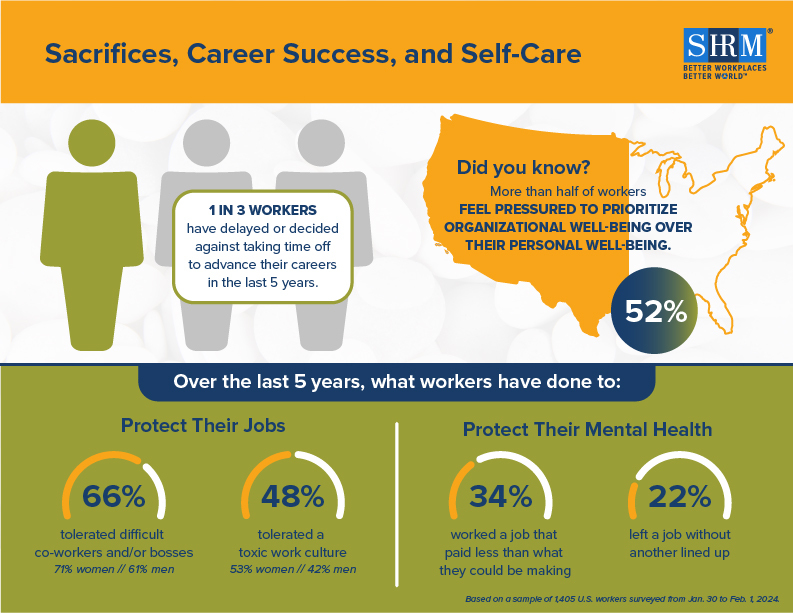Nearly 1 in 3 employees say their job frequently causes them stress, according to new research from SHRM.
The data, released during Mental Health Awareness Month in May, shows that 30% of 1,405 surveyed employees say their job often makes them feel stressed, 26% often feel “overwhelmed” by their job, and 22% often feel disengaged from their job.
“Negative emotions are exceptionally more salient than positive emotions, and entirely more difficult for employees to let go of,” said Daroon Jalil, a senior researcher at SHRM who led the mental health research initiative. “So, when employees are experiencing these negative emotions, and experiencing them often, which is the real concern, it can lead to long-term negative consequences for the employee and the organization.”
Additionally, more than 1 in 3 employees (35%) said their job has a negative effect on their mental health, although nearly as many (34%) said their job has a positive effect on their mental health.
That positive impact can take several forms: Half of workers said their jobs often make them feel “like they belong,” while 40% often feel fulfilled by their jobs. About 1 in 3 employees said their job often made them feel happy (36%) or enthusiastic (32%).
SHRM researchers found that such feelings had noticeable effects:
- Workers who feel a strong sense of belonging at their organization are two and a half times less likely to feel burned out from their work (27% versus 69%).
- Workers who often feel fulfilled are significantly more likely to go above and beyond what is expected of them at work (92% versus 56%).
- Workers who feel they can be their authentic self at work are two and a half times less likely to feel emotionally drained from their work (29% versus 73%).
The research follows recent reports from mental health services provider ComPsych that anxiety levels in the U.S. have risen dramatically in the past few years, and that mental health-related absences at work ballooned by 33% from 2022 to 2023.
Telltale Signs Your Company Culture Is Unhealthy
SHRM’s research also revealed the main contributors to employee stress:
- Workload (64% of respondents).
- Pay/compensation (57%).
- The nature of their work (48%).
- Poor leadership or management (46%).
- Understaffing (42%).
- Lack of recognition for their work (38%).
Workers whose managers have a positive impact on their mental health are twice as likely to say they believe in the mission of their organization (91% versus 43%), according to SHRM researchers.

Jen Mahone Rightler, an HR and inclusion, equity, and diversity leader based in Flower Mound, Texas, said that a job that hurts an employee’s mental health can damage organizational productivity, as well as the individual’s personal life.
“Some of the telltale signs of an unhealthy workplace are indicative in the recruiting process, but you must be open to seeing them,” she explained.
According to Culture Shift, a U.K.-based software company, red flags indicating an unhealthy culture include:
- Core values aren’t well-defined.
- Managers aren’t following the core values.
- Employees are leaving at high rates.
- Gossiping pervades the office.
- Employees are often late or absent from work.
- Employees rarely take lunch breaks.
- The company has bad reviews.
Brennan Nevada Johnson, CEO of PR agency Brennan Nevada Inc. in New York City, believes that a lack of diversity in age, gender, and race can lead to increased stress and anxiety in the workplace. Research has shown that improving diversity and inclusion can enhance the mental well-being of employees.
“I quit toxic corporate America because of [a toxic workplace] and took my business full-time,” she said. “I couldn't accept the burnout feeling that my job was causing, even though I was one of the top- performing employees.”
Employee Mental Health Requires Trust, Respect
A healthy company culture plays a significant role in supporting employees’ mental health. An environment of trust, respect, and open communication can create a safe space for employees to talk about their mental health challenges without the fear of stigma or discrimination.
Rightler laid out several ways companies can better support the mental health of their workforce:
- Create a culture of human-centered leadership.
- Incorporate mindfulness into training methodologies at all levels of the organization.
- Have a sense of curiosity without judgment.
- Offer guidance and help, but do so without any bias attached.
- Connect with others on an emotional level.
- Extend support without expectation.
“If you allow yourself to be honest about the above principles,” Rightler said, “you should be to get to a place of acceptance, which will help you determine what changes you as a human-centered leader need to incorporate.”
An organization run by AI is not a futuristic concept. Such technology is already a part of many workplaces and will continue to shape the labor market and HR. Here's how employers and employees can successfully manage generative AI and other AI-powered systems.




